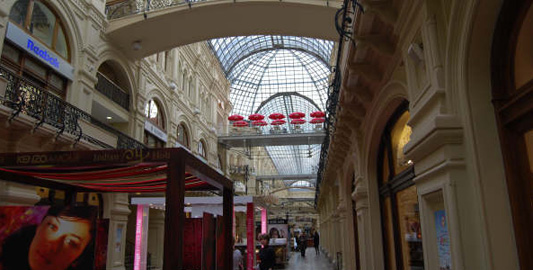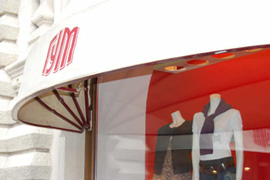Money makes Putin’s world go round
Russian president leaves a legacy of affluence but many still struggle.

 |
| Russia’s economy has seen a complete turnaround |
The designer clothes shops and sports car dealerships that are found across Moscow show how far Russia has come since the financial collapse of 1998 that saw shelves emptied of even the most basic items.
Vladimir Putin, the outgoing president, has largely been credited with turning the economy around and raising living standards across the country.
“People became rich and confident in the future under Putin,” Lena, a Moscow resident walking through the centre of the city told Al Jazeera.
| In depth | |
|
Focus |
The president took power with a formidable list of challenges, including massive foreign debts and political instability, with the people had lost much of their faith in the economy after savings were wiped out in the 1998 financial collapse.
“Under Putin our economy has made excellent progress,” Evsey Gurvich, head of the Moscow-based Economic Expert Group, said.
“Russia’s GDP [gross domestic product] has risen by 70 per cent and real wages have grown by more than three times in eight years,” he told Al Jazeera.
Some people have benefited more than others from Putin’s success.
Russia now has 53 billionaires, worth more than $282bn between them, according to Forbes magazine survey in 2007, and Moscow was named as the world’s most expensive place to live for the second consecutive year.
Poverty remains
But when you travel out of the centre of the capital you will see that life remains hard for many poorer residents.
“My money is enough for food, for a flat, for the necessary but nothing more,” Ivanov Roman told Al Jazeera as he shopped at one of the markets where many Russians still buy their food, clothes and household goods.
More than 40 per cent of Russians spend more than half of their income on food, according to a recent survey by the All-Russia Centre for the Study of Public Opinion.
Public transport, water, gas and electricity have all become more expensive in recent years.
Natalya, a stallholder who declined to give her surname, complained that the increased costs meant she had to working longer and longer hours.
“Salaries and social payments from the government are rising, but prices are rising also,” she said.
“I live outside Moscow and must wake up at 4am everyday to come to work, and only arrive home at around midnight.”
The All-Russia Centre for the Study of Public Opinion survey also found that more than two-thirds of Russians had no savings.
Popular president
Support for Putin remains high even here though.
Tatyana Samoilova, another stallholder selling clothes, said that all Russians had benefited under the outgoing president.
“If prices go too high Putin immediately increases support for old people, for the poor,” she said.
 |
| Russian shops wear a new look now |
“He is choosing the right strategy. Our president is great, you don’t have such as Putin.”
Gurvich acknowledged that the gap between Russia’s rich and poor had increased slightly during the Putin era but said that “at the same time the number of people living at subsistence level has increased substantially”.
Russia’s growth came on the back of rising oil prices, the cost of a barrel has more than quadrupled since Putin took power in 2000, reaching $100 in January.
Nikolai Petrov, an analyst from the Carnegie Institute in Moscow, said that it was this dependence on energy resources was what could create problems in the future.
“I would say that all attempts to convert from the oil and gas sectors into other areas have had pretty limited success,” he said.
“Inflation is increasingly high and there is a lot of speculation about a banking crisis.”
Medvedev alike
Gurvich, however, says that growth would probably continue under new president.
“The growth is sustainable, trade will increase and that is fundamental to improving household incomes. My estimate is that oil and gas is responsible for just two percent of GDP growth out of seven per cent,” he said.
Some commentators have suggested that when people turn out to vote for Dmitry Medvedev, Putin’s chosen successor, they will really be celebrating the outgoing leader’s success in moving the country on from the era of soaring inflation and shortages.
“If Medvedev wins hopefully Putin’s legacy will continue,” Lena said before she hurried away towards the shops.
